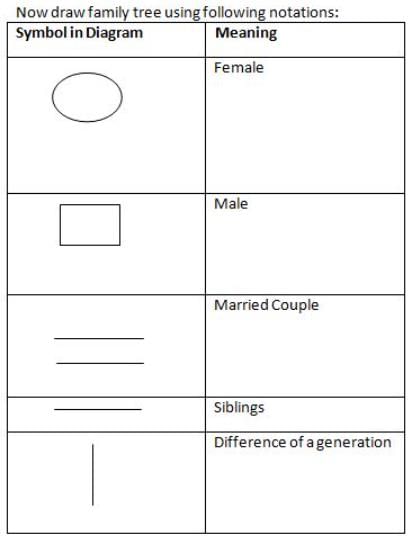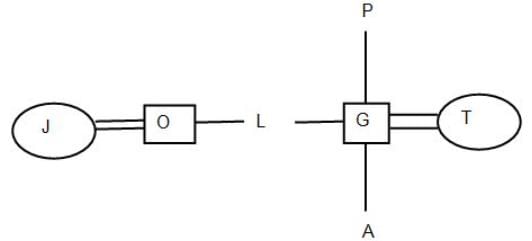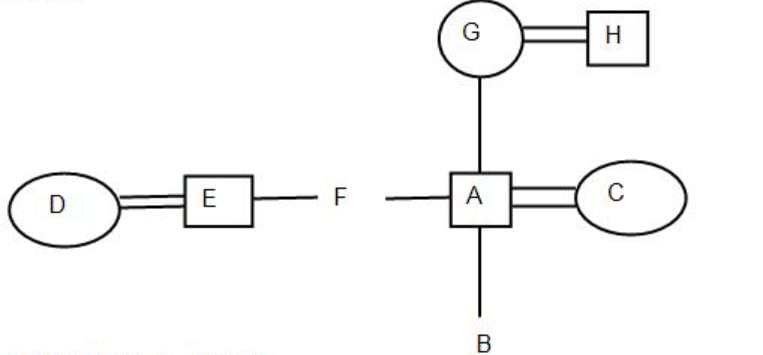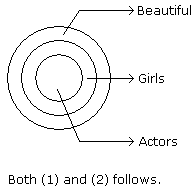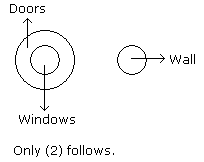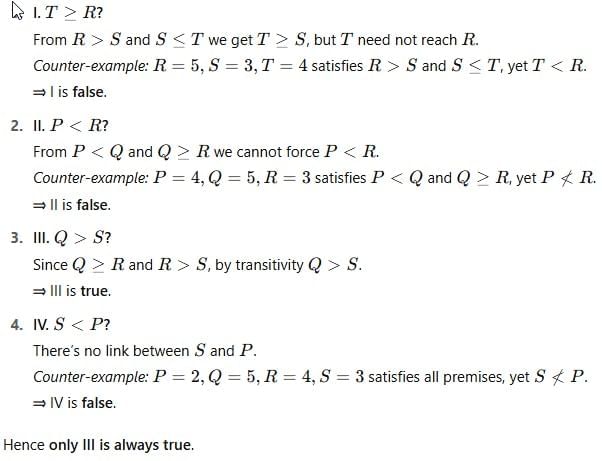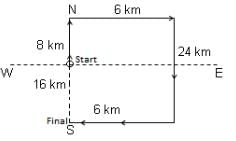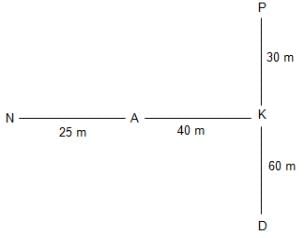IDBI Executive Mock Test - 6 - Bank Exams MCQ
30 Questions MCQ Test - IDBI Executive Mock Test - 6
Directions: Study the following information carefully to answer the given Questions:
P^Q-P is the child of Q
P!Q-P is the parent of Q
P*Q - P is elder to Q
P#Q-P is younger to Q
P@Q-P is brother of Q
P&Q - P is wife of Q
P+Q-P is sister-in-law of Q
Q. If G! A^T+J&O@L^P! G, then how is J related to A?
P!Q-P is the parent of Q
P*Q - P is elder to Q
P#Q-P is younger to Q
P@Q-P is brother of Q
P&Q - P is wife of Q
P+Q-P is sister-in-law of Q
Directions: Study the following information carefully to answer the given Questions:
P^Q - P is the child of Q
P!Q - P is the parent of Q
P*Q - P is elder to Q
P#Q - P is younger to Q
P@Q - P is brother of Q
P&Q - P is wife of Q
P+Q - P is sister-in-law of Q
Q. If A!B^C+D&E@F^G!A and G is the wife of H then how is G related to C?
P!Q - P is the parent of Q
P*Q - P is elder to Q
P#Q - P is younger to Q
P@Q - P is brother of Q
P&Q - P is wife of Q
P+Q - P is sister-in-law of Q
Read the passage below and solve the questions based on it.
1. In a joint family of seven persons A, B, C, D, E, F and G, there are two married couples.
2. G is a housewife and her husband is a lawyer. ‘C’ is the wife of ‘B’, ‘A’ is an engineer and is granddaughter of ‘G’. ‘D’ is the father-in-law of ‘C’, a doctor, and father of ‘E’, a Professor. ‘F’ is A’s brother and B’s son.
Who is a lawyer?
2. G is a housewife and her husband is a lawyer. ‘C’ is the wife of ‘B’, ‘A’ is an engineer and is granddaughter of ‘G’. ‘D’ is the father-in-law of ‘C’, a doctor, and father of ‘E’, a Professor. ‘F’ is A’s brother and B’s son.
Prakash, Qureshi, Rajesh and Shabdesh live together in a house.
1. Prakash lives with his (or her) parents.
2. Qureshi lives with at least 3 persons younger than him (or her).
3. Shabdeesh lives with his mother and is older than at least 2 persons living with him.
4. Rajesh lives with his (or her) son and is not older than Shabdeesh.
Q. The total number of people in that house is ______.
Prakash, Qureshi, Rajesh and Shabdesh live together in a house.
1. Prakash lives with his (or her) parents.
2. Qureshi lives with at least 3 persons younger than him (or her).
3. Shabdeesh lives with his mother and is older than at least 2 persons living with him.
4. Rajesh lives with his (or her) son and is not older than Shabdeesh.
Qureshi is Prakash’s ______.
There are six people A, B, C, D, E and F each having different weight. A is heavier than F but lighter than B. E is heavier than C but lighter than A. B is higher than D. C is not the lighest. The second lighest person weight 52kg while the third lighest is of 64kg.
Q.
Who among the following may be 58 kg in weight?
There are six people A, B, C, D, E and F each having different weight. A is heavier than F but lighter than B. E is heavier than C but lighter than A. B is higher than D. C is not the lighest. The second lighest person weight 52kg while the third lighest is of 64kg.
Q.
How many persons are heavier than C?
In this following question, four words have been given, out of which three are alike in some manner and the fourth one is different. Choose out the odd one out.
Directions to Solve
In each of the following questions find out the alternative which will replace the question mark.
Question -
CUP : LIP :: BIRD : ?
Directions to Solve
In each of the following questions find out the alternative which will replace the question mark.
Question -
Flow : River :: Stagnant : ?
Directions to Solve: In each of the questions below consists of a question and two statements numbered I and II given below it. You have to decide whether the data provided in the statements are sufficient to answer the question. Read both the statements and
Give answer:
- (A) If the data in statement I alone are sufficient to answer the question, while the data in statement II alone are not sufficient to answer the question
- (B) If the data in statement II alone are sufficient to answer the question, while the data in statement I alone are not sufficient to answer the question
- (C) If the data either in statement I alone or in statement II alone are sufficient to answer the question
- (D) If the data given in both statements I and II together are not sufficient to answer the question and
- (E) If the data in both statements I and II together are necessary to answer the question.
Question: Who is to the immediate right of P among five persons P, Q, R, S and T facing North ?
Statements:
I.R is third to the left of Q and P is second to the right of R.
II.Q is to the immediate left of T who is second to the right of P.
Directions to Solve: In each of the questions below consists of a question and two statements numbered I and II given below it. You have to decide whether the data provided in the statements are sufficient to answer the question. Read both the statements and
Give answer:
- (A) If the data in statement I alone are sufficient to answer the question, while the data in statement II alone are not sufficient to answer the question
- (B) If the data in statement II alone are sufficient to answer the question, while the data in statement I alone are not sufficient to answer the question
- (C) If the data either in statement I alone or in statement II alone are sufficient to answer the question
- (D) If the data given in both statements I and II together are not sufficient to answer the question and
- (E) If the data in both statements I and II together are necessary to answer the question.
Question: On which date of the month was Anjali born in February 2004 ?
Statements:
I.Anjali was born on an even date of the month.
II.Anjali's birth date was a prime number.
Directions to Solve: In each of the questions below consists of a question and two statements numbered I and II given below it. You have to decide whether the data provided in the statements are sufficient to answer the question. Read both the statements and
Give answer:
- (A) If the data in statement I alone are sufficient to answer the question, while the data in statement II alone are not sufficient to answer the question
- (B) If the data in statement II alone are sufficient to answer the question, while the data in statement I alone are not sufficient to answer the question
- (C) If the data either in statement I alone or in statement II alone are sufficient to answer the question
- (D) If the data given in both statements I and II together are not sufficient to answer the question and
- (E) If the data in both statements I and II together are necessary to answer the question.
Question: How is F related to P ?
Statements:
I.P has two sisters M and N.
II.F's mother is sister of M's father.
Directions to Solve: In each of the questions below consists of a question and two statements numbered I and II given below it. You have to decide whether the data provided in the statements are sufficient to answer the question. Read both the statements and
Give answer:
- (A) If the data in statement I alone are sufficient to answer the question, while the data in statement II alone are not sufficient to answer the question
- (B) If the data in statement II alone are sufficient to answer the question, while the data in statement I alone are not sufficient to answer the question
- (C) If the data either in statement I alone or in statement II alone are sufficient to answer the question
- (D) If the data given in both statements I and II together are not sufficient to answer the question and
- (E) If the data in both statements I and II together are necessary to answer the question.
Question: How is X related to Y ?
Statements:
I.Y says, "I have only one brother".
II.X says, "I have only one sister".
Directions to Solve: In each of the questions below consists of a question and two statements numbered I and II given below it. You have to decide whether the data provided in the statements are sufficient to answer the question. Read both the statements and
Give answer:
- (A) If the data in statement I alone are sufficient to answer the question, while the data in statement II alone are not sufficient to answer the question
- (B) If the data in statement II alone are sufficient to answer the question, while the data in statement I alone are not sufficient to answer the question
- (C) If the data either in statement I alone or in statement II alone are sufficient to answer the question
- (D) If the data given in both statements I and II together are not sufficient to answer the question and
- (E) If the data in both statements I and II together are necessary to answer the question.
Question: B is the brother of A. How is A related to B ?
Statements:
I.A is the sister of C.
II.E is the husband of A.
Directions to Solve
In each of the following questions two statements are given and these statements are followed by two conclusions numbered (1) and (2). You have to take the given two statements to be true even if they seem to be at variance from commonly known facts. Read the conclusions and then decide which of the given conclusions logically follows from the two given statements, disregarding commonly known facts.
Give answer:
- (A) If only (1) conclusion follows
- (B) If sonly (2) conclusion follows
- (C) If either (1) or (2) follows
- (D) If neither (1) nor (2) follows and
- (E) If both (1) and (2) follow.
Question -
Statements: All the actors are girls. All the girls are beautiful.
Conclusions:
- All the actors are beautiful.
- Some girls are actors.
Directions to Solve
In each of the following questions two statements are given and these statements are followed by two conclusions numbered (1) and (2). You have to take the given two statements to be true even if they seem to be at variance from commonly known facts. Read the conclusions and then decide which of the given conclusions logically follows from the two given statements, disregarding commonly known facts.
Give answer:
- (A) If only (1) conclusion follows
- (B) If sonly (2) conclusion follows
- (C) If either (1) or (2) follows
- (D) If neither (1) nor (2) follows and
- (E) If both (1) and (2) follow.
Question -
Statements: All the windows are doors. No door is a wall.
Conclusions:
- Some windows are walls.
- No wall is a door.
Statements:
A ≥ B; C > G; A ≥ H;
B ≥ C; I = B
Conclusions:
I. C > H
II. H > B
III. B > G
IV. I > A
Statements:
A=B; C≤F; G>C; B<F
Conclusions:
I. F < B
II. F > G
III. A > G
IV. A > C
Statements:
A≤H, G≥H; G>M; O≤M
Conclusions:
I. G≥A
II. G≥O
III. H>M
IV. H≤G
Statement :
P ≥ Q > R < S ≤ T
Conclusion:
I. T > R
II. T > Q
III. R < P
IV. Q > P
Statement :
P < Q ≥ R > S ≤ T
Conclusion:
I. T ≥ R
II. P < R
III. Q > S
IV. S < P
Directions: This question given below is followed by two arguments numbered I and II. You have to decide which of the following arguments is a ‘strong’ argument and which is a ‘weak’ argument.
Statement:
Should the vehicle of anyone driving without a licence be impounded?
Arguments:
I. Yes. Driving without a licence is in violation of law.
II. No. Sometimes people hesitate to keep the original licence with them at all times due to the fear of misplacing them.
Directions: This question given below is followed by two arguments numbered I and II. You have to decide which of the following arguments is a ‘strong’ argument and which is a ‘weak’ argument.
Statement:
Should cricket be included in the Olympics?
Arguments:
I. Yes. It is hugely popular in countries like India and England.
II. No. On the whole, only a handful of countries have prominent cricket teams, whereas Olympics require participation from most of the countries of the World.
Directions: This question given below is followed by two arguments numbered I and II. You have to decide which of the following arguments is a ‘strong’ argument and which is a ‘weak’ argument.
Statement:
Should ‘Politics’ be taught in schools?
Arguments:
I. Yes. An informed electorate is the key to a strong democracy.
II. No. Politics and education should not be mixed as it will affect both adversely.
Directions: This question given below is followed by two arguments numbered I and II. You have to decide which of the following arguments is a ‘strong’ argument and which is a ‘weak’ argument.
Statement:
Should ‘Personal Finance’ be taught in schools?
Arguments:
I. Yes. It will equip the school students with knowledge about investing, savings etc and help them in making informed decisions when they’re earning.
II. No. School students should be kept away from money matters as it can have a negative impact on them.
Directions: This question given below is followed by two arguments numbered I and II. You have to decide which of the following arguments is a ‘strong’ argument and which is a ‘weak’ argument.
Statement:
Should Railways levy a small modernization surcharge on the passengers?
Arguments:
I. Yes. It was greatly help the railways in generating the required funds for modernizing various facilities provided by them.
II. No. It will greatly imbalance the budget of an average household.
Martin starts from his house and walks 8 km towards North. From there, he takes a right turn and walks 6 km. Then, he turns right and walks 24 km. He again takes a right turn and walks 6 km. How far is he from his house?
Directions: Study the information given below carefully and answer the question that follows.
In a playground, Dinesh, Kunal, Nitin, Atul and Prashant are standing, as described below, facing north.
(i) Kunal is 40 metres to the right of Atul.
(ii) Dinesh is 60 metres to the south of Kunal.
(iii) Nitin is 25 metres to the west of Atul.
(iv) Prashant is 90 metres to the north of Dinesh.
Q. If a boy walks from Nitin, meets Atul followed by Kunal, Dinesh and then Prashant, provided that he has travelled a straight distance all through, how many metres has he walked?
Directions: Study the given information and answer the following question.
In a certain code language:
'play books during winters' is coded as 9@h 16@h 26#b 13#t.
'apples look red blink' is coded as 22@w 12#p 22#h 13@p.
'study novels wrist luck' is coded as 8@g 15#h 23@b 24#p.
'chairs doors blue right' is coded as 19@g 6#v 9#h 9@h.
Q. Using the given rules, find the code for 'student perfect'.



